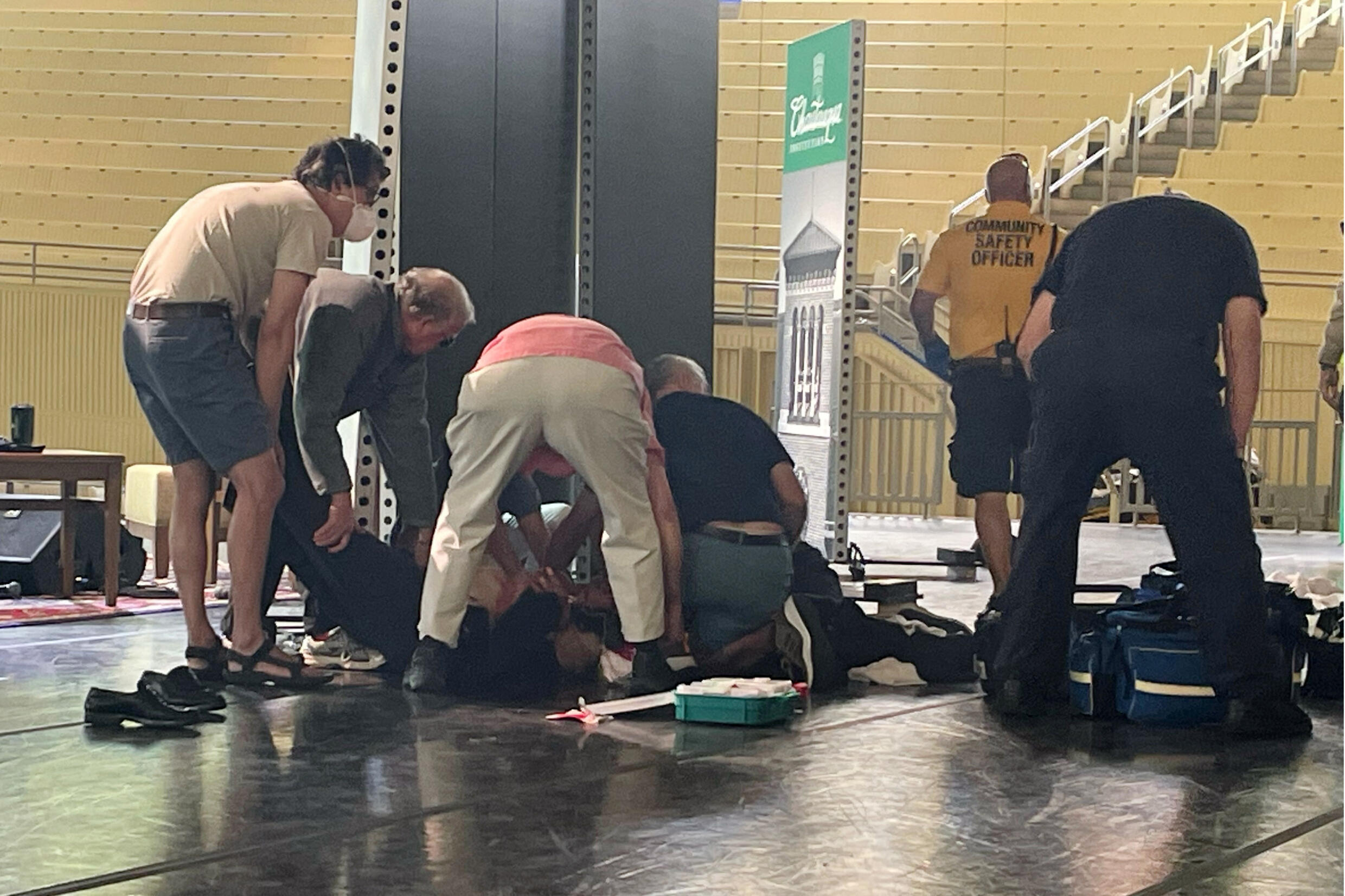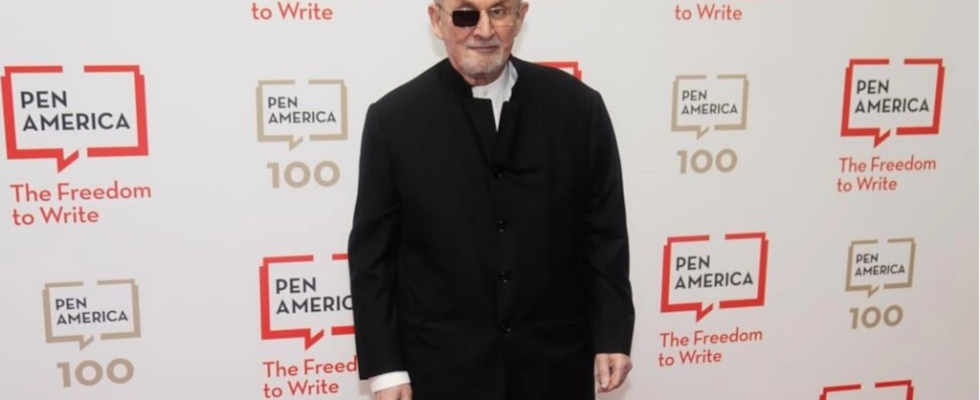In his new essay The knife, Indian-American novelist Salman Rushdie reflects on the near-fatal attack he suffered two years ago at a literary conference in New York. The work is also intended to be a meditation on the power of writing and love which accompanied the author on the path to healing.
“ It was essential that I wrote this book: a way of welcoming what happened and responding to violence through art ”, can we read on the back cover of the new book by Salman Rushdie. Published last April and already recipient of the Constantinople Prize awarded to literary works which bridge the gap between the cultures and civilizations of the West and the East, The knife recounts the stabbing attack of which the author was the victim in the United States on August 22, 2022 and how he managed the physical and psychological after-effects of this terrible attack. Both a clinical and chronological account of the attack and the “miracle” of the author’s survival, this work is also a powerful and poignant reflection on love and literature as so many antidotes against darkness and dead.
The work opens with a dedication: “ This book is dedicated to the men and women who saved my life “. Highlighted at the beginning of Knife, the sentence sets the tone of this new work by Salman Rushdie where gratitude takes precedence over anger, love over hatred, art over violence and death. This text, inspired by one of the most painful chapters in the author’s life, is not devoid of the qualities of irony, humor and inventiveness, which are the trademarks of the author. The abundant work of this great novelist of Indo-Pakistani origin, naturalized American.
The “fatwa”
Born in 1947 in Bombay, India, Rushdie was educated in England where he lived until the late 1990s when he moved to the United States where he has lived ever since. His work is composed of essays, memoirs and above all around twenty novels including The Satanic Verses with iconoclastic writing, which set a part of the Muslim world ablaze when it was published in 1988.
This novel, which draws its inspiration from the life and work of the Prophet Muhammad, told in a parodic mode, earned Rushdie a fatwa issued by the founder of the Islamic Republic of Iran, Ayatollah Khomeini. This fatwa, which targeted the author, but also the publishers and translators of the incriminated novel, calls “ all Muslims to execute them wherever they find them “.
His life threatened, Salman Rushdie lived in hiding for a long time, under police protection, before enjoying a certain freedom of movement since his move to the United States. Even if the fatwa was not formally lifted by the Iranian authorities, in New York where the writer settled, he was able to live in the open over the last two decades, participating freely in social and literary life New Yorker.
While everyone considered that the story of the fatwa now belonged to the past, Salman Rushdie was the subject of a violent knife attack on August 12, 2022 during a literary conference on the shores of the American Great Lakes, in northern New York. He came close to death. It is this drama that tells The knife.
Stabbed 15 times in 27 seconds
” HAS ten forty-five o’clock on August 12, 2022, on a sunny Friday morning in upstate New York, I was attacked and nearly murdered by a young man armed with a knife just after being took the stage at the Chautauqua Amphitheater to speak about the importance of keeping writers safe “.
Thus begins the work, followed by a detailed account of the aftermath of the attack. The man with the knife hits Rushdie in the neck, in the chest, in the eye, in the arm… He is stabbed 15 times in 27 seconds, enough time to declaim out loud a Shakespeare sonnet, the author points out, before that the madman is not controlled by the public. The victim will lose a lot of blood while waiting for him to be treated by emergency doctors and transferred by helicopter to the trauma departments of the nearest hospital.
Lying for long minutes on the stage of the amphitheater where he had just spoken, the writer was only conscious, he remembers, of the unbearable physical pain, the fear of dying far from his loved ones and of… ” thumb » placed on his deepest wound to prevent blood from gushing out. The owner of the thumb, a retired firefighter, was “ one of the many people who saved my life », maintains Rushdie.
Paradoxically, his assailant also helped save his life. This is what his doctors will confirm when he leaves the hospital, “ Do you know how lucky you were? That’s because whoever attacked you didn’t have the slightest idea how to kill a man with a knife. »
To the first person
Rushdie realized very early on, before he had fully recovered, that he would have to write about this attack, which almost killed him. For a long time, he had cherished the ambitious project of a novel inspired by Kafka, but had difficulty getting to work. It was André Wylie, his literary agent for 30 years, who had become a close friend, who put the chip in his ear, drawing his attention to the imperative need for him to confront his assailant on the blank page, in order to be able to reconnect with fictional writing.
“ Something huge and not at all fictitious had happened to me, and I realized that Andrew Wylie had been right, writes Rushdie. Until I face the attack, I won’t be able to write anything else. (…) Writing would be for me a way of appropriating this story, of taking charge of it, of making it mine, refusing to be a simple victim. »
The knife was born from this reflection. It is reminiscent of Salman Rushdie’s autobiography, published in 2012 and entitled Joseph Anton. It was the author’s code name while he was in hiding, a very literary code name made up of the first names of his favorite writers: Conrad and Chekhov. Between memoirs and reflections, the two works are similar in their style, in their emphasis on the constantly recurring struggle between fanaticism and reason, even if the autobiography is written in the third person and the story of the attack in the first person. “ When someone sticks a knife in you, it’s pretty personal. It’s more in the first person », Adds Rushdie.
“My A, stupid and angry”
However personal the attack and its consequences were, Rushdie’s description of it always remains distanced and imbued with modesty. The account of the attack in the first pages is striking for its meticulous sobriety, the emotion kept on a leash, while we imagine the septuagenarian author groaning in pain under the stab wounds inflicted by his young 24-year-old assailant. years.
Even later, when the writer gradually regains his intellectual abilities, becoming aware of the irreparable damage caused by the aggression, there will be no vituperations, insults or cries. Only anger, controlled anger, perhaps coupled with contempt, which is reflected in Rushdie’s choice to refer to his assassin by the neutral nickname with which he gave him: “A” for donkey. “ My A, stupid and angry » !

Magnanimous, he recalls the youth of his assailant (“ he seems absurdly young, almost touching “), underlines the harmful influence of religious fanatics that he suffered (” the madness of ignorant youth “). He wants to meet him to understand the true motivations behind his evil act. His model is a certain Samuel Beckett who, after narrowly surviving a knife attack in Paris on January 7, 1938, attended the trial of his attacker. Then, coming face to face, he asked him why he had done this. “ I don’t know, sir, I apologize ”, came the response, according to legend. Rushdie, for his part, does not ultimately go to meet his A, preferring to imagine a fictional dialogue with him, which ultimately turns out to be the least convincing part of his book.
The reader will only remember that in the eyes of the writer, the main crime of his failed murderer is literary: “ One of the annoying aspects of what happened at Chautauqua is thathe writes, less for a while or perhaps forever, this novel has been placed in a story of scandal. »
Eliza’s smile
Divided into eight chapters, The knife is organized into two large sections, symbolically designated “ Angel of Death ” And ” The Angel of Life “. The two sections evolve in counterpoint, one dominated by the “A”, Rushdie’s dark and fanatic assailant, and the other by the luminous figure of an extraordinary woman, the wife of the victim.
Less than thirty years old than her husband, a poet and novelist in his turn, Rachel Eliza Griffith is the fifth wife of Salman Rushdie. With humor and exuberance, The knife tells their first meeting, the story of an unexpected love at first sight, which illuminated the days and nights of the septuagenarian novelist. “ She was made of beauty and terrors », writes the old loving bard. And to add: “ Reader, that smile was not easy to forget “.
Eliza had not accompanied Rushdie on his trip to Chautauqua. Her friends called her to warn her of the misfortune that had just struck her husband. It was explained to him that as the wounds were numerous and deep, he might not survive. The next day, she was at his bedside, taking charge. “ At the moment when I was reduced to a state of extreme weakness, she became my rock, our indestructible rock “, says Salman Rushdie.
Eliza will be the pillar around which the writer has rebuilt himself. His love, his concern are not foreign to survival “ miraculous » of her bruised husband. This realization will not prevent the latter from wondering if their love would survive the catastrophe of the assassination attempt. Having experienced a sentimental life “ serrated “, Rushdie knows that love is a ” bohemian child », elusive and enigmatic. “ We were happy », he keeps repeating.
Shakespeare and Tex Avery
Elegy of the world before August 12, 2022, The knife reads also and perhaps above all as an ode to world literature and cinema, which constitute the cornucopia from which the novelist Rushdie always drew his inspiration, “ through a game of free associations “, according to the author himself.
His new book is no exception to the rule. Summoning Shakespeare, Beckett, Maya Angelou, the Mahabharata, but also Tex Avery and George Méliès, this ultimate story of battles against religious obscurantism, celebrates the freedom of thought and being that Salman Rushdie reluctantly embodies. In its pages, everything makes sense: The knife of the title just like the survival of the blasphemous poet, who has become the central issue of our post-liberal world.
► The Knife: reflections following an assassination attempt, by Salman Rushdie. Translated from English by Gérard Meudal. Gallimard, 269 pages, 23 euros.
